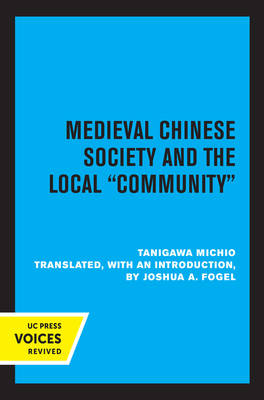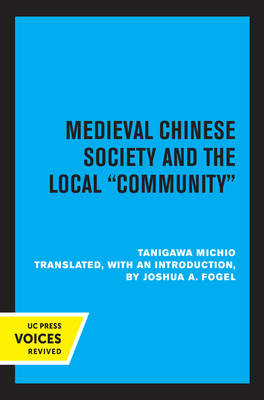
- Afhalen na 1 uur in een winkel met voorraad
- Gratis thuislevering in België vanaf € 30
- Ruim aanbod met 7 miljoen producten
- Afhalen na 1 uur in een winkel met voorraad
- Gratis thuislevering in België vanaf € 30
- Ruim aanbod met 7 miljoen producten
Zoeken
€ 161,45
+ 322 punten
Uitvoering
Omschrijving
Medieval Chinese Society and the Local Community: Stagnation, Feudalism, and Periodization explores the rich complexities of Chinese history from the Six Dynasties through the Sui and Tang eras. This seminal volume by Tanigawa Michio reexamines the nature of Chinese society and its periodization through a critical lens, moving away from traditional Marxist interpretations that dominated postwar Japanese sinology. Through the innovative concept of kyodotai--a communitarian framework transcending simplistic class divisions--Tanigawa challenges the stagnationist narrative often applied to China's historical development. He argues that the ethical and social cohesion within local communities provided a foundation for China's distinctive form of "medieval" society, distinguishing it from Western feudalism and shaping its cultural and social trajectory. This groundbreaking work not only critiques Marxist orthodoxy but also revisits and revitalizes the theories of earlier sinologists, such as Naitō Konan, to present a more nuanced understanding of China's historical evolution. By focusing on the Six Dynasties' social structures, Tanigawa reveals the enduring impact of literati-aristocratic leadership and the transformative integration of Confucian and Taoist ethics in governance. The book is an essential read for scholars of Chinese history, providing fresh perspectives on periodization debates and enriching the discourse on the interplay between class, community, and culture in medieval China. This title is part of UC Press's Voices Revived program, which commemorates University of California Press's mission to seek out and cultivate the brightest minds and give them voice, reach, and impact. Drawing on a backlist dating to 1893, Voices Revived makes high-quality, peer-reviewed scholarship accessible once again using print-on-demand technology. This title was originally published in 1985.
Specificaties
Betrokkenen
- Auteur(s):
- Vertaler(s):
- Uitgeverij:
Inhoud
- Aantal bladzijden:
- 182
- Taal:
- Engels
Eigenschappen
- Productcode (EAN):
- 9780520362000
- Verschijningsdatum:
- 27/08/2021
- Uitvoering:
- Hardcover
- Formaat:
- Genaaid
- Afmetingen:
- 140 mm x 216 mm
- Gewicht:
- 353 g

Alleen bij Standaard Boekhandel
+ 322 punten op je klantenkaart van Standaard Boekhandel
Beoordelingen
We publiceren alleen reviews die voldoen aan de voorwaarden voor reviews. Bekijk onze voorwaarden voor reviews.







